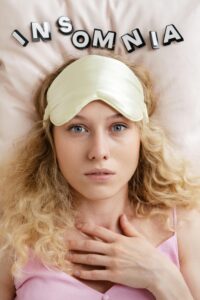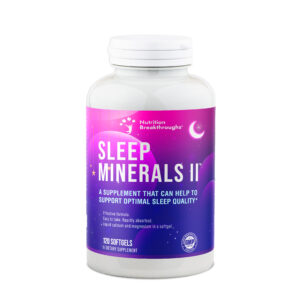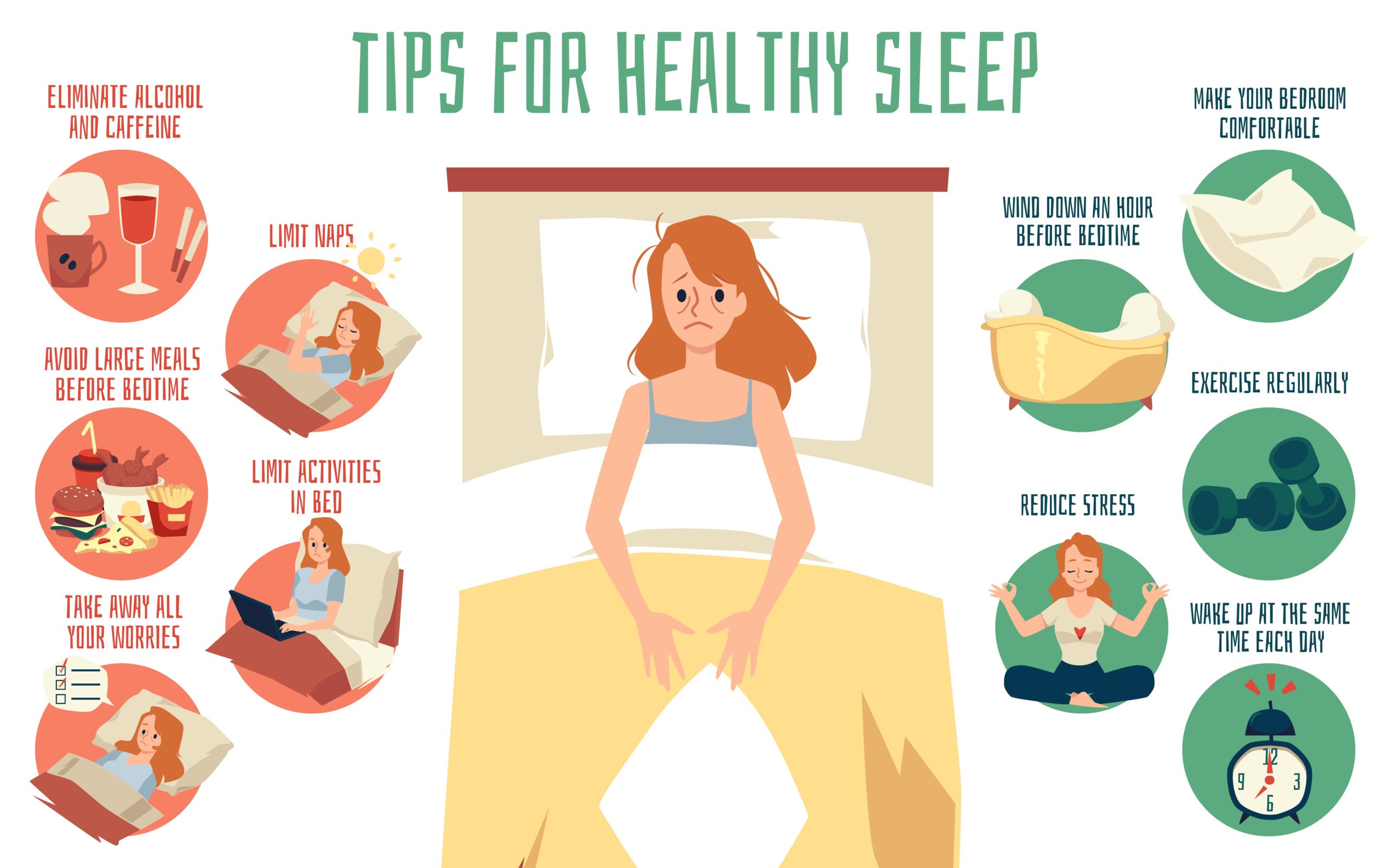 According to the National Sleep Foundation (NSF), almost six out of ten Americans report having insomnia and sleep problems at least a few nights a week. According to the National Sleep Foundation (NSF), almost six out of ten Americans report having insomnia and sleep problems at least a few nights a week.
Insomnia is defined as “An inability to fall asleep or remain asleep long enough to feel rested, especially when the problem continues over time.” In an effort to combat this, as many as 25 percent of the people in the United States use medications to help them sleep. Most sleeping pills, especially when taken over long periods of time, can have multiple side effects. The drugs stay in the bloodstream, give a hangover effect the next day and beyond, and can increase the risk of car and work accidents. They also impair memory and performance on the job and at home. From a nutritional perspective, several research studies have shown certain minerals to be an effective natural insomnia remedy to help people fall asleep and stay asleep throughout the night. James F. Balch, M.D., author of Prescription for Nutritional Healing, writes: “A lack of the nutrients calcium and magnesium will cause you to wake up after a few hours and not be able to return to sleep.” Calcium is directly related to our cycles of sleep. In one study, published in the European Neurology Journal, researchers found that calcium levels in the body are higher during some of the deepest levels of sleep, such as the rapid eye movement (REM) phase. The study concluded that disturbances in sleep, especially the absence of REM deep sleep or disturbed REM sleep, are related to a calcium deficiency. Restoration to the normal course of sleep was achieved following the normalization of the blood calcium level. William Sears, M.D. writes: “Calcium helps the brain use the amino acid tryptophan to manufacture the sleep-inducing substance melatonin. This explains why dairy products, which contain both tryptophan and calcium, are one of the top sleep-inducing foods.” In magnesium deficiency, chronic insomnia is one of the main, central symptoms. Sleep is usually agitated with frequent nighttime awakenings. On the other hand, a high magnesium, low aluminum diet has been found to be associated with deeper, less interrupted sleep. This was proven in a study done by James Penland at the Human Nutrition Research Center in North Dakota. It’s important to note that a balanced ratio of calcium and magnesium is important to overall health, and that these two minerals should be taken together in a two to one ratio (twice as much calcium as magnesium) for best results. Jobee Knight, a nutritional researcher and founder of Nutrition Breakthroughs in Glendale California, is someone who fought her own battle against sleeplessness and insomnia. She decided to put her background to use by searching out effective natural insomnia remedies for relaxation and deeper sleep. The result was Sleep Minerals II, a sleep remedy that contains highly absorbable forms of calcium and magnesium, combined with vitamin D and zinc. The ingredients are formulated in a softgel with healthy oils, making them more quickly absorbable than tablets or capsules and providing a deeper, longer-lasting sleep. Richard P. of Parkville, Maryland says: *The Sleep Minerals are making quite a difference. I was regularly waking up at around 3:00 a.m. and couldn’t go back to sleep. Now I wake up once to go to the bathroom, but the great thing is, I then fall back asleep and sleep several more hours.* Valerie H. of Santa Clarita, California says: *I had such bad menopause insomnia, it took me hours to fall asleep even though I was extremely tired. After a week of taking the Sleep Minerals it started to work really well. I fall asleep now within 20 minutes.* For more information on Sleep Minerals II, click here. |
||||||||||||
Tag Archives: best minerals for sleep
Signs of Magnesium Deficiency: Studies to Remedy Sleep, Bones, Headaches
 Signs of Magnesium Deficiency: Studies to Remedy Sleep, Bones, Headaches
Signs of Magnesium Deficiency: Studies to Remedy Sleep, Bones, Headaches
Magnesium is one of the most vital minerals for good health. It’s involved in over 300 functions in the body and is a required partner for enzymes which allows them to do their job.
Enzymes are high-energy protein molecules that are the spark for positive reactions in all the cells of the body and magnesium helps to provide the spark. A deficiency of magnesium can result in muscle aches and pains, leg cramps, fatigue, insomnia, migraine headaches, restless leg syndrome, bone loss, anxiety and high blood pressure.
Osteoporosis
From the journal of Biology and Trace Element Research comes a study showing that magnesium prevents bone loss in postmenopausal women. The women were given magnesium citrate for 30 days and at the end of the trial, the structural collagen in their bones increased and bone loss was halted.
Insomnia
In a study from the University of Medical Sciences in Iran, research was done with 46 adults who were experiencing insomnia. Taking two magnesium oxide tablets twice a day resulted in significant increases in sleep time and reduced cortisol levels in the body, which is a stress hormone that can keep people awake. In another research study from the Human Nutrition Research Center of the U.S. Dept. of Agriculture, scientists found that a high magnesium diet is associated with deeper, less interrupted sleep and prevents magnesium deficiency.
High Blood Pressure
Hypertension or high blood pressure is a leading cause of stroke. A stroke happens when the blood supply to the brain is reduced, which causes damage to brain cells. The American Journal of Clinical Nutrition analyzed the role of magnesium in preventing stroke and found that taking magnesium each day reduces stroke risk by 8%.
Restless Leg Syndrome
A study from the Journal “Sleep” showed positive results for restless leg syndrome. Magnesium was administered orally in the evening over a period of 4-6 weeks. Following magnesium treatment, restless leg movements associated with waking in the night decreased significantly. The researchers said: “Our study indicates that magnesium treatment may be a useful alternative therapy.”
Migraines
Studies have found that people with migraine headaches have low concentrations of magnesium in their body with magnesium deficiency. The word “cephalalgia” literally means head pain or headache. In a German study of 81 migraine patients published in the journal “Cephalalgia”, 42 percent of the people taking oral magnesium reduced both the duration and intensity of their migraine attacks. They also reduced their reliance on medications to control migraines.
One supplement shown to be effective for insomnia and pain is Sleep Minerals II from Nutrition Breakthroughs. This formula contains highly absorbable magnesium citrate and calcium citrate, the best minerals for sleeplessness and insomnia, as well as for heart health, restless legs syndrome, bone strength and menopause insomnia. It also includes vitamin D and zinc and is delivered in a softgel form with healthy carrier oils, making it more quickly absorbable than tablets or capsules and providing a deeper, longer-lasting sleep.
L.R.C. of Massachusetts says: “I had become dependent on sleeping drugs and couldn’t sleep without them. Now I take the Sleep Minerals before bed and I can sleep through the night without drugs. I’m also able to easily fall back to sleep if I do have to get up. Another benefit is it helps alleviate my chronic fatigue and aches and pains.”
Magnesium is more than a magnificent supplement. It’s a vital natural measure that can be used to maintain or restore one’s good health. For more information, visit the Sleep Minerals II page.
Insomnia and Stress: Studies Find Sleep Remedies
 Sometimes the stresses, pressures and demands at work or at home can interfere with our good sleep.
Sometimes the stresses, pressures and demands at work or at home can interfere with our good sleep.
Stress manifests on the physical level by an outpouring of adrenal gland hormones such as cortisol.
The adrenal glands are two small triangular-shaped glands that sit on top of each kidney. During those times when stress hormones are poured into the body, they can deplete our calcium levels — a mineral known to help with relaxation and good sleep.
The adrenal hormone cortisol has a stimulating effect and can promote wakefulness at the very time when one is trying to fall asleep or stay asleep during the night. Scientists have recently discovered that increased blood levels of cortisol exist in people with chronic insomnia.
In one recent study in the Journal of Clinical Endocrinology & Metabolism, investigators monitored the sleep of eleven patients with insomnia and thirteen people without sleep disorders. Blood was collected every thirty minutes for twenty-four hours, and levels of adrenal stress hormones were monitored.
They found the level of adrenal hormones were significantly higher in the people with insomnia as opposed to the group that slept well. The insomniacs with the highest degree of sleep disturbances produced the highest amounts of cortisol in the nighttime hours.
Another aspect is that it appears people become more sensitive to the stimulating effects of cortisol as they age. Researchers at the Pennsylvania State University found that when both young and middle-aged men were administered a version of cortisol, the middle-aged men remained awake longer and slept less deeply than the younger ones.
This finding applies to aging women as well, who tend to experience insomnia and sleeplessness as a significant aspect of their premenopause and menopause symptoms.
From a nutritional perspective, the mineral calcium has long been known as a natural aid to relaxation and sleep and is directly related to our cycles of sleep. In one study published in the European Neurology Journal, researchers found that calcium levels in the body are higher during some of the deepest levels of sleep, such as the rapid eye movement (REM) phase.
The study concluded that disturbances in sleep, especially the absence of REM deep sleep or disturbed REM sleep, are related to a calcium deficiency. Restoration to the normal course of sleep was achieved following the normalization of the blood calcium level.
Research in the American Journal of Physiology reveals that in the presence of elevated cortisol levels, the amount of calcium is rapidly reduced in the body.
Studies have shown that calcium declines for as long as the cells are exposed to cortisol, but promptly return to its normal level once the stress hormone is removed. In light of recent discoveries about the relationship between stress hormones and calcium depletion, it’s likely that nighttime calcium levels can be restored and insomnia calmed by supplementing with a highly absorbable form of calcium.
One natural sleep aid that is gaining popularity due to its readily assimilated forms of calcium and magnesium is Sleep Minerals II from Nutrition Breakthroughs.
This insomnia remedy contains easily absorbed forms of calcium and magnesium mixed with healthy oils in a softgel, making it more absorbable than tablets or capsules and providing a deeper, longer-lasting sleep. It also calms the nerves and muscles and reduces restless leg syndrome and menopause insomnia.
L.R.C. of Massachusetts says: “Due to some very stressful issues in my life, I hadn’t slept much in two and a half months before being prescribed sleeping drugs. I had become dependent on them and couldn’t sleep without them. I did my research on the Internet and came across Sleep Minerals II. I take these before bed and now I can sleep through the whole night without drugs. And if I do have to get up, I can fall right back asleep. Another benefit is it also helps alleviate my chronic fatigue and aches and pains.”
Some other good tips to support one’s health and well-being in stressful times include eating nourishing foods such as brightly colored vegetables and healthy proteins, taking food supplements like B complex vitamins, vitamin C and magnesium, and doing some enjoyable daily exercise such as walking.
For more information, visit the Sleep Minerals II page.
Reviews of Sleep Minerals II from Nutrition Breakthroughs
 Reviews of Sleep Minerals II from Nutrition Breakthroughs
Reviews of Sleep Minerals II from Nutrition Breakthroughs
According to the National Sleep Foundation (NSF), almost six out of ten Americans report having insomnia and sleep problems at least a few nights a week.
Insomnia is defined as “An inability to fall asleep or remain asleep long enough to feel rested, especially when the problem continues over time.”
In an effort to combat this, as many as 25 percent of the people in the United States use medications to help them sleep.
Most sleeping pills can have multiple side effects — staying in the bloodstream and giving a hangover effect the next day and beyond. They tend to be addictive, can increase the risk of car and work accidents, and may impair one’s memory and performance on the job and at home.
Sleep Minerals II is the original, drug-free calcium and magnesium based sleep remedy. The minerals are uniquely formulated in a softgel with natural oils, making them highly absorbable. The minerals soothe insomnia and help everyone from older adults, to teenagers, to women with menopause symptoms, and even those with restless leg syndrome, to get a good night’s sleep.
James F. Balch, M.D., author of “Prescription for Nutritional Healing,” writes: “A lack of the nutrients calcium and magnesium will cause you to wake up after a few hours and not be able to return to sleep.”
Alex R. of Ramseur, North Carolina shares his review and says: “Sleep Minerals II has been a blessing for me. It has given me the opportunity to withdraw from a highly addictive sleep medication over time, and has allowed me to sleep while going through this most difficult ordeal. What’s great about it is it doesn’t lose its effectiveness, which is something that happens with medications. I am most thankful for this product.”
Chris M. of the United Kingdom says: “I take one softgel of Sleep Minerals II before bed every night and within 20 minutes I am asleep. The difference in the quality of my sleep and the ease with which I get to sleep using this product is monumental. I have stopped obsessing about sleep or dreading bedtime — I just take a softgel and drift off. If I stop taking them, within a week my sleep starts to lighten in quality, the amount of my sleep diminishes, and my old insomniac patterns reappear.”
Richard P. of Parkville, Maryland says: “The Sleep Minerals are making quite a difference. I was regularly waking at around 3:00 a.m. and after a few days use my sleep improved quite a lot. I wake once a night to go to the bathroom, but the great thing is; I then fall back asleep and sleep several more hours. This has been a great improvement.”
Sadie D. from The Netherlands says: “I am ever so grateful that I discovered Sleep Minerals II after suffering with premenopause and now the real menopausal insomnia. I felt like I was slowly losing my mind due to the continual lack of sleep. I can’t express the relief of getting a good night’s sleep and being able to function properly.”
Jill C. of Ellensburg, Washington says: “My husband has been struggling with restless leg syndrome (RLS) his whole life. Coming back from a deployment in Iraq five years ago made his RLS become magnificently worse, creating nightly insomnia. He couldn’t sleep more than three to five hours unless taking an addictive prescribed narcotic, which he became tolerant to and the insomnia came back with no answers. Now he’s been taking Sleep Minerals II for a week and every night has had a great night’s sleep. We are thrilled.”
Darleen T. of La Mesa, California says: “I purchased Sleep Minerals for my teenage daughter. When she started on the minerals she hadn’t been sleeping well for the past couple of years. She was run down and feeling beyond her years… exhausted. She is only 18. Once she started on Sleep Minerals she actually became tired at night, which is new. She can fall into a restful sleep by 10:30 p.m. and sleep all night. This product is a heaven send and has given her a life back.”
Tammy M. of Meridian, Idaho says: “I was plagued with insomnia for five years and desperate for a breakthrough. Nothing has helped me more than the Sleep Minerals — I’m so sold on them I could go door to door promoting them. I’m 60 years old and have never slept so soundly. Thank you for making sleep a reality for so many people.”
This news is provided by Nutrition Breakthroughs. Since 2001 Nutrition Breakthroughs has provided natural health articles and effective natural remedies. Their mission is to provide nutritional supplements that get results and help people to avoid drugs and their side effects.
Since 2009, their natural sleep aid Sleep Minerals II has been keeping that promise — by soothing even the worst insomnia with absorbable calcium and magnesium and helping everyone from teenagers, to women with menopause symptoms, to those with restless leg syndrome, to get a good night’s sleep.
For more info on Sleep Minerals II, visit this page.
Hot Flashes, Night Sweats: Sage Leaf Effective
 Sage leaf is a delicious herb used in cooking, particularly with poultry and pasta sauces, and it has a long history of use for medicinal purposes.
Sage leaf is a delicious herb used in cooking, particularly with poultry and pasta sauces, and it has a long history of use for medicinal purposes.
It belongs to the mint family, along with oregano, rosemary and thyme.
It’s been used by herbalists to treat sore throats, strengthen the nervous system and improve brain function. The German Health Commission officially approved the use of sage for excessive sweating and one German study found sage to reduce excessive perspiration by 50%. Sage leaf is also a well-researched remedy for hot flashes and night sweats in menopause.
In a breakthrough study from Switzerland, researchers examined the use of a fresh sage preparation for treating hot flashes and other menopause symptoms in women. The women were an average age of 56, they were menopausal for at least 12 months, and they experienced 5 or more hot flashes per day. The women took a daily tablet of fresh sage leaves for 8 weeks.
The average number of hot flashes decreased considerably each week from week 1 to week 8. Mild hot flashes decreased by 46%, moderate flashes decreased by 62%, severe hot flashes decreased by 79%, and very severe ones decreased by 100%. The Swiss researchers concluded that fresh sage has great value in the treatment of hot flashes and other related menopause symptoms.
Italian scientists have also taken an interest in studying sage for women at menopause. They set out to study the effects of a combination of sage and alfalfa leaves on symptoms such as hot flashes, night sweats, insomnia, dizziness, headaches and heart palpitations.
The Italian study lasted for three months and followed thirty menopausal women who took a sage and alfalfa supplement daily. At the end of the study, hot flushes and night sweats had completely disappeared in twenty of them and the others had reduced symptoms – making the combination of sage and alfalfa an effective remedy for menopause discomforts.
The minerals calcium and magnesium have also been the subject of studies on hot flashes. One study from the Virginia University Health System found that magnesium supplements reduced hot flash frequency in women from 52 to 28 per week — a 41% reduction.
One natural sleep aid with benefits for hot flashes is Sleep Minerals II from Nutrition Breakthroughs. This softgel formula contains highly absorbable forms of calcium and magnesium, the best minerals for sleeplessness and insomnia, as well as for hot flashes, night sweats, heart health, restless legs syndrome, bone strength, teenage insomnia and menopause insomnia.
Anita L. of New Caney, Texas says: “I was having hot flashes every 30 minutes to an hour through the night and was so miserable. After about two weeks of taking the Sleep Minerals, I noticed an incredible difference with my sleep. I have much less interruption from flashes, I’m sleeping much better and I’m a lot more comfortable.”
Natural menopause remedies such as sage, alfalfa, calcium and magnesium are healthy options for women with hot flashes and insomnia. For more information on Sleep Minerals II visit this page.
Magnesium Foods: Remedy Insomnia and Pain
 Magnesium deficiency is very common these days. A recent government study shows that 68% of Americans do not consume the recommended daily intake of magnesium, which is 400 milligrams per day.
Magnesium deficiency is very common these days. A recent government study shows that 68% of Americans do not consume the recommended daily intake of magnesium, which is 400 milligrams per day.
Magnesium can be found in foods such as green leafy vegetables, black beans, pumpkin seeds, almonds, avocados, figs, bananas, brown rice, and other beans, nuts and seeds. Magnesium supplements are a good option as well, particularly those containing magnesium citrate which is very absorbable.
Sidney Baker, M.D., a practicing doctor with a special interest in the nutritional aspects of chronic health problems says: “Magnesium deficiency can affect virtually every organ and system of the body. One may experience muscle twitches, cramps, soreness, back aches, neck pain, tension headaches, and fatigue or weakness.”
Studies show that magnesium can soothe insomnia, support heart health, normalize blood sugar, relieve headaches and ease menopause symptoms. In one study from the University of Iran, people with insomnia were given magnesium tablets twice a day for eight weeks. They experienced significant increases in quality sleep time, with less night time interruptions and fewer early morning awakenings.
Magnesium can help prevent diabetes. Researchers at the Harvard School of Public Health evaluated the dietary intake of specific nutrients for more than 85,000 women and 42,000 men. They found that the men and women whose diets included the largest amounts of magnesium were the least likely to develop type 2 diabetes. Most of the participants consumed magnesium through foods, such as whole grains, nuts and green leafy vegetables.
Studies have found that people with migraine headaches have low concentrations of magnesium in their body. The word “cephalalgia” literally means head pain or headache. In a German study of 81 migraine patients published in the journal “Cephalalgia”, 42 percent of the people taking oral magnesium reduced both the duration and intensity of their migraine attacks. They also reduced their reliance on medications to control migraines.
One supplement shown to be helpful for insomnia and pain is Sleep Minerals II from Nutrition Breakthroughs. This formula contains highly absorbable forms of calcium citrate and magnesium citrate, the best minerals for sleeplessness and insomnia, as well as for heart health, aches and pains, bone strength and menopause insomnia.
Sleep Minerals II also includes vitamin D and zinc and is delivered in a softgel form with healthy carrier oils, making it more quickly absorbable than tablets or capsules and providing a deeper, longer-lasting sleep.
L.R.C. of Massachusetts says: “I had become dependent on sleeping drugs and couldn’t sleep without them. Now I take the Sleep Minerals before bed and I can sleep through the night without drugs. I’m also able to easily fall back to sleep if I do have to get up. Another benefit is it helps alleviate my chronic fatigue and aches and pains.”
For more information, visit the Sleep Minerals II page.
Studies: Magnesium Benefits Insomnia, Hot Flashes, Heart
 Studies: Magnesium Benefits Insomnia, Hot Flashes, Heart and Bones
Studies: Magnesium Benefits Insomnia, Hot Flashes, Heart and Bones
What qualities make magnesium such an essential mineral, required by the body for literally hundreds of its functions?
One key feature of magnesium is that it’s a partner or “co-factor” with enzymes that allows them to do their work.
Enzymes are energized protein molecules that initiate chemical reactions inside the cells – orchestrating life’s processes in every organ, gland, tissue and cell.
Research studies are finding that magnesium affects over 300 processes in the body, relaxes muscles and nerves, and helps insomnia, hot flashes, heart health, bone strength, diabetes, migraine headaches and more.
According to the Human Nutrition Research Center of the U.S. Dept. of Agriculture, one of the main symptoms of magnesium deficiency is chronic insomnia, restless sleep and frequent awakenings during the night. In one of their studies, a diet high in magnesium contributed to deeper sleep with fewer interruptions.
Another study from the University of Medical Sciences in Iran was done with 46 adults who were experiencing insomnia. Two magnesium tablets twice a day (250 mg. each) resulted in significant increases in sleep time and reduced cortisol levels in the body, which is a stress hormone that can keep people awake.
Hot flashes and night sweats are common symptoms of premenopause and menopause. Regarding magnesium for menopause, a study was done at the Virginia University Health System. Women who experienced hot flashes many times per week received 400 milligrams of magnesium for 4 weeks — increasing to 800 milligrams per day if needed. At the end of the study, the magnesium supplements had reduced their frequency of hot flashes by half. Fatigue, sweating, and distress were also significantly reduced.
Magnesium is also magnificent for the heart. In a study from the American Journal of Clinical Nutrition, research scientists examined data from thousands of women over the course of a 26-year follow up period. The women who consumed the highest amounts of magnesium had a 34% reduced risk of sudden cardiac death. Another study from the journal “Circulation” found that magnesium supplements allow people with heart disease to exercise for longer times and it actually helps repair the ability of blood vessels to open up.
Supplements with well-absorbed forms of magnesium are becoming increasingly popular for those with insomnia. One of the more effective sleep aids is Sleep Minerals II from Nutrition Breakthroughs. It contains calcium and magnesium in combination with vitamin D and zinc. The minerals and vitamins are formulated in a softgel with healthy oils; creating a creamy paste inside that results in quick absorption and a deeper, longer-lasting sleep.
Kimberly B. of Troy, Michigan says: “I have been taking Sleep Minerals II for about a month now. I have tried everything out there and this supplement is amazing. I have suffered with insomnia for 2 1/2 years. I have also had restless leg syndrome my entire life and this is the first relief I’ve ever had…gone for a month now.”
Magnesium is one of the super-heroes of natural remedies. This health news is shared by Nutrition Breakthroughs, maker of the original calcium and magnesium based sleep aid Sleep Minerals II. For more information on the many benefits of magnesium and calcium, visit the Sleep Minerals II page.
Reviews of Sleep Minerals II for Restless Leg Syndrome
 Restless leg syndrome (RLS) is a form of insomnia characterized by an overwhelming urge to move the legs when they are at rest, especially during sleep. Recent research studies have found that people with restless leg syndrome are deficient in the mineral magnesium.
Restless leg syndrome (RLS) is a form of insomnia characterized by an overwhelming urge to move the legs when they are at rest, especially during sleep. Recent research studies have found that people with restless leg syndrome are deficient in the mineral magnesium.
Those who have restless leg syndrome experience unpleasant sensations in the legs described as creeping, crawling, tingling, pulling or painful. People with RLS often experience chronic insomnia and sleeplessness due to the strong urge to walk or do other activities to relieve the sensations in their legs at night.
In one study from the Romanian Journal of Neurology, researchers conducted tests in people with RLS. They found agitated sleep and frequent periods of night time awakenings, with a decrease of the deeper “rapid eye movement” (REM) sleep – also found in other forms of insomnia caused by magnesium deficiency.
Sleep Minerals II is a drug-free, calcium and magnesium based sleep aid that is one of the more effective restless leg syndrome remedies. The minerals are uniquely formulated in a softgel with natural oils, making them more highly absorbable than tablets or capsules. The formula soothes insomnia and helps everyone from older adults, to teenagers, to women with menopause symptoms, and even those with restless leg syndrome — to get a good night’s sleep.
Kimberly B. of Troy Michigan says: “I have been taking Sleep Minerals II for about a month now. I have tried everything out there and this supplement is amazing. I have suffered with insomnia for two and a half years and have had restless leg syndrome my entire life. This is the first relief I’ve ever had…it’s gone for a month now.”
J.M. of Florida says: “My restless legs were so bad that after 5:00 p.m. I could hardly sit down for two minutes without my legs moving. After taking the Sleep Minerals II for a while, my restless leg syndrome is greatly diminished and I’ve noticed I’m getting more and more sleep.”
Anne and Bob B. of El Dorado Hills, California says: “We find the Sleep Minerals very helpful for my husband’s restless leg syndrome. He does not do well on many medications and the drug the doctor prescribed for this was full of bad side effects. Out of pure desperation, I researched the internet and came up with an article about Sleep Minerals II and decided to try them. They have been wonderful. Bob continues to sleep much better and with very little, if any, movement in his legs.”
Valerie. H. in Santa Clarita, CA. says: “I had such bad menopause insomnia that I couldn’t fall asleep. It took me hours to get to sleep even though I was very tired. I also had creepy crawly feelings in my legs at night. I got the Sleep Minerals II and started taking it. I fall asleep now within 20 minutes and no more restless legs.”
Jill C. of Ellensburg, Washington says: “My husband has been struggling with restless leg syndrome his whole life. He couldn’t sleep more than three to five hours unless taking an addictive prescribed narcotic, which he became tolerant to and the insomnia came back with no answers. Now he’s been taking Sleep Minerals II for a week and every night has had a great night’s sleep. We are thrilled.”
This news is shared by Nutrition Breakthroughs, a provider of natural health articles and effective remedies since 2001. Its mission is to provide nutritional supplements that get results and help people to avoid drugs and their side effects. Since 2009, their natural sleep aid Sleep Minerals II has been keeping that promise – by soothing even the worst insomnia with absorbable forms of calcium and magnesium.
For more info on Sleep Minerals II, visit this page.
Insomnia Remedies Needed, 25% of U.S. takes Sleep Drugs
 Sleeplessness is a big problem in America. According to the National Sleep Foundation (NSF), almost six out of ten Americans report having insomnia at least a few nights weekly.
Sleeplessness is a big problem in America. According to the National Sleep Foundation (NSF), almost six out of ten Americans report having insomnia at least a few nights weekly.
Additionally, in a recent NSF poll they found that as many as 25 percent of the people in the U.S. use medications in an effort to combat insomnia and get some sleep.
The use of prescription sleeping drugs, such as Ambien, Lunesta and Sonata, has been steadily increasing. Global sales for all sleeping pills, called hypnotics, will top $5 billion in the next several years. Most sleeping pills, especially when taken over long periods of time, stay in the bloodstream and give a hangover effect the next day and beyond. They impair memory, reduce performance on the job and at home, and contribute to machine and car accidents.
From a nutritional perspective, several research studies have shown certain minerals to be effective alternatives to help people fall asleep and stay asleep through the night. James F. Balch, M.D., author of Prescription for Nutritional Healing, writes: “A lack of the nutrients calcium and magnesium will cause you to wake up after a few hours and not be able to return to sleep.”
The pioneering nutritionist Adelle Davis discusses minerals as natural insomnia remedies in her book Let’s Get Well. She says: “A calcium deficiency often shows itself by insomnia, another form of an inability to relax. The harm done by sleeping tablets, to say nothing of the billions of dollars spent on them, could largely be avoided if the calcium intake were adequate.”
Regarding magnesium, Davis says: “Hundreds of recent studies indicate that almost everyone, especially ill persons, is deficient in magnesium. Probably no other single deficiency is so responsible for the widespread use of tranquilizers.”
Calcium is directly related to our cycles of sleep. In one study, published in the European Neurology Journal, researchers found that calcium levels in the body are higher during some of the deepest levels of sleep, such as the rapid eye movement (REM) phase. The study concluded that disturbances in sleep, especially the absence of REM deep sleep or disturbed REM sleep, are related to a calcium deficiency. Restoration to the normal course of sleep was achieved following the normalization of the blood calcium level.
In magnesium deficiency, chronic insomnia is one of the main, central symptoms. Sleep is usually agitated with frequent nighttime awakenings. On the other hand, a high magnesium diet has been found to be associated with deeper, less interrupted sleep. This was proven in a study done by James Penland at the Human Nutrition Research Center in North Dakota. The study was titled “Effects of trace element nutrition on sleep patterns in adult women.”
It’s important to note that a balanced ratio of calcium and magnesium is beneficial to overall health, and that these two minerals should be taken together in a 2 to 1 ratio for best results (twice as much calcium as magnesium).
Jobee Knight, a nutritional researcher and founder of www.NutritionBreakthroughs.com in Clearwater, FL., is someone who fought her own battle against sleeplessness and insomnia. She decided to put her background to use by searching out effective natural ingredients for relaxation and deeper sleep.
The result was Sleep Minerals II, a natural sleep aid that contains highly absorbable forms of calcium and magnesium, the best minerals for insomnia, as well as for heart health, restless legs syndrome, bone strength and menopause insomnia. The formula also includes vitamin D and zinc and is delivered in a softgel form with healthy carrier oils, making it more quickly assimilated than tablets or capsules and providing a better, longer-lasting sleep.
Alex R. of Ramseur, North Carolina says: “Sleep Minerals II has been a blessing for me. It has given me the opportunity to withdraw from a highly addictive sleep medication over time, and has allowed me to sleep while going through this most difficult ordeal. What’s great about it is it doesn’t lose its effectiveness, which is something that happens with sleep medications. I am most thankful for this product.”
Sleeping drugs can wreak havoc on one’s health and well-being. The right blend of natural minerals can be an effective natural insomnia remedy that helps the sleepless get some good rest.
For more information, visit the Sleep Minerals II page.
Info Chart: Tips for Better Sleep – How to Remedy Insomnia
Greetings to you,
It’s Jobee Knight from Nutrition Breakthroughs. I’ve included a beneficial chart for you below with several key tips for better sleep. This chart is full of great advice, with many things that are supported by research studies.
For example, a study was published in the journal Sleep Health titled: “Walk to a better night of sleep: Testing the relationship between physical activity and sleep.” It found that people who walked more and had more low-impact physical activity slept better and with a higher sleep quality than those who didn’t.
More tips for better sleep: Regarding the benefits of taking calcium at bed time, one study published in the European Neurology Journal discovered that the normal course of sleep is restored following the normalization of the blood calcium level.
This news is provided to you by Nutrition Breakthroughs, maker of the effective natural sleep aid Sleep Minerals II.
Here’s to your good health and great sleep,
Jobee Knight
Nutrition Breakthroughs



